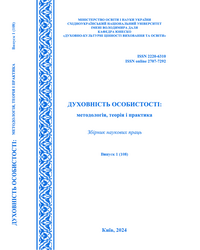CATEGORIES OF CULTURE AND CULTURAL CODE: UPBRINGING ASPECTS OF THE EDUCATIONAL PROCESS IN MODERN CONDITIONS (ON THE EXAMPLE OF MUSICAL COURSES)
DOI:
https://doi.org/10.33216/2220-6310/2024-109-2-15-24Keywords:
culture, cultural code, methodology, educational process, musical courses, musical activity, pedagogical activity, education, professional trainingAbstract
The article substantiates the ideological and methodological significance of the category of culture in the process of professional training of musicians and music teachers as a core concept of education. The distinction between the content of professional training and education orientation with all their affinity and partial coincidence allows to distinguish the ideological components of the formation of civic consciousness of the individual with the allocation of the national component which becomes a methodological part of the educational process of professional training of students of higher educational institutions. The logical tool of this part is the category of cultural code which plays a synthesizing role in the formation of any person’s consciousness, but it is of particular importance for representatives of creative artistic professions and teachers. Therefore, a special allocation and definition of these categories seems to be mandatory in the content and semantic filling up of educational courses, especially the humanities cycle. It is offered to interpret culture on the basis of the achievements of national philosophical and cultural thought as a “way of human life ”based on the classical European tradition of its understanding as an “improvement” of everything that is the result of human activity. Thus, the boundary between the purely human and the non-human becomes clear, which in the methodological sense is a development and at the same time overcoming the limitations of the anthropological approach in the humanities. Music and musical activities in general provide an opportunity to show a person as a concentration of culture, and the cultural code as a way of treating purely human traits, especially freedom. Thus, the content of academic courses acquires educational significance in the cultural sense as opposition and counteraction to the extra-cultural, i.e. non-human (natural, barbaric, animal, etc.). The ideological significance of solving this problem is further actualized in the conditions of russian aggression against Ukraine.

